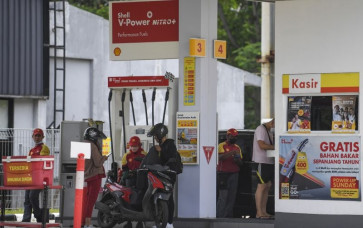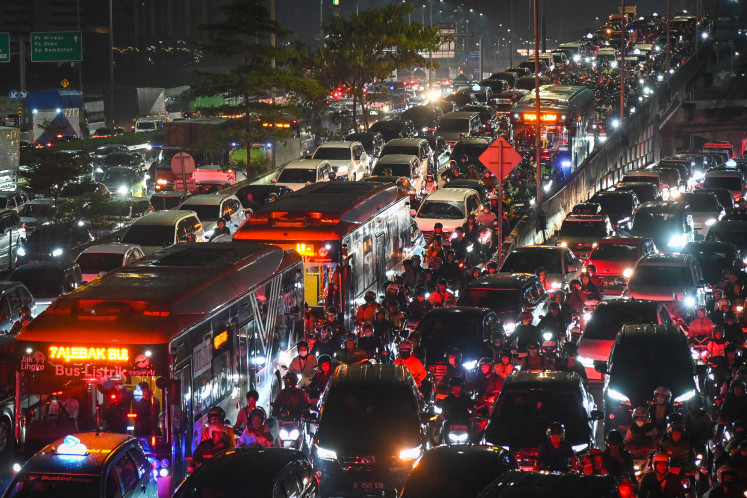Popular Reads
Top Results
Can't find what you're looking for?
View all search resultsPopular Reads
Top Results
Can't find what you're looking for?
View all search resultsAvailability of land remains big issue for food self-sufficiency
Bringing in the sheaves: Women harvest rice on a farm in Maos Kidul village, Cilacap Regency, Central Java on Monday
Change text size
Gift Premium Articles
to Anyone
B
span class="caption">Bringing in the sheaves: Women harvest rice on a farm in Maos Kidul village, Cilacap Regency, Central Java on Monday. Land conversion to non-agriculture uses such as housing is a tough issue for the government's food self-sufficiency target and it aims to convert between 100,000 hectares and 110,000 hectares into farmland. JP/Agus Maryono
Like many of his fellow farmers, Timin Martodihardjo has converted his main crop from soybean to other produce because the price of the commodity is too low for him to earn a decent livelihood.
'Production costs are now very high, partly driven by the rise in prices of pesticides and fertilizer, while the soybean price remains low. We find planting soybean no longer attractive,' said the former soybean grower in Nganjuk, East Java.
'The soybean price is about Rp 7,000 [54 US cents] per kilogram and can go as low as Rp 3,500 in some areas,' Timin said. He added that growing soybean would be attractive only if the price was at least Rp 10,000 per kilogram.
Crop conversion undertaken by small farmers like Timin, who manages a farm of less than 1 hectare, is only one of the tough issues that need to be addressed by President Joko 'Jokowi' Widodo to wean the country off its dependence on imported food crops, such as rice, corn and soybean, by 2017.
A similar food self-efficiency target, a sacred tenet in Indonesia, was touted by the past administration of Susilo Bambang Yudhoyono, but proved a failure as the country's fast-growing population of 250 million outpaces its ability to supply its own food.
Rice imports from Thailand and Vietnam, which reached 676,496 tons in 2010, only shrank slightly to 672,621 tons in 2014, Central Statistics Agency (BPS) data show.
To meet its self-sufficiency program, the government aims to see unhusked rice production rise from 73.45 million tons this year to 78.13 million tons by 2017, corn output from 20.31 million tons to 22.36 million tons and soybean output from 1.2 million tons to 2.76 million tons, according to the Agriculture Ministry's director general for food crops, Hasil Sembiring.
The government has implemented a wide range of measures to attain such a target, such as converting between 100,000 and 110,000 hectares of land into farming areas, improving irrigation channels to cover 1 million hectares and distributing seeds, fertilizer and farming equipment. An idea to build commercial farms through food estates, which was also a failure of the prior government, are also under discussion between relevant stakeholders.
On land provision, Agrarian and Spatial Planning Minister Ferry Mursyidan Baldan said the ministry would be ready to prepare more farmland to support the self-sufficiency program.
'The new farmland can be sourced from, for example, forests and idle land. We can also use unproductive agricultural land,' he said.
However, Ferry could not say how the government would acquire the land because not all the designated land was owned by the state. Acquiring the land from the owners could be difficult and take years.
Currently, 3.4 million hectares, or 42 percent, of 8.1 million hectares of farmland are located on the most densely populated Java Island, raising concerns over the spread to other parts of the sprawling archipelago of more than 17,000 islands.
Sutarto Alimoeso, chairman of the Indonesian Rice Millers and Entrepreneurs Association (Perpadi), said the land issue was the most crucial problem that needed to be tackled to achieve the target.
'For soybean, new farming areas are urgently needed. Without this, it will be very difficult to attain the self-efficiency target,' said Sutarto, a former official at the State Logistics Agency (Bulog).
Tejo Wahyu Jatmiko, the national coordinator of the Alliance for Prosperous Villages (ADS), a group of 15 NGOs that focuses on food and rural issues, said the availability of land for food production should be guaranteed as stipulated in Law No. 41/2009 to ensure the self-sufficiency target was achieved.
'But so far, we see that no serious efforts have been made to stop the conversion of farmland for other uses on the priority list, such as the development of infrastructure,' he said, adding that a reform would engage the active participation of local governments to guarantee land for food production instead of commercial purposes.










